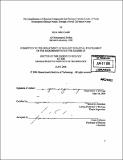The identification of chemical compounds that decrease cellular levels of toxic Huntington's disease protein through a novel cell-based assay
Author(s)
Coufal, Myra Alfert
DownloadFull printable version (10.73Mb)
Other Contributors
Massachusetts Institute of Technology. Dept. of Biology.
Advisor
David E. Housman.
Terms of use
Metadata
Show full item recordAbstract
Huntington's disease (HD) is a progressive degenerative neurological disorder. Individuals who inherit the IT15 gene with an expansion of the CAG repeat region inevitably succumb to increasingly sever motor, psychological, and cognitive symptoms. I sought to develop an assay system with the capability for identification of chemical compounds that selectively decrease the intracellular levels of disease-causing expanded polyglutamine huntingtin (Htt) protein without reducing the intracellular levels of the potentially protective normal Htt. To achieve this goal I designed a cell-based assay using the enzymatic activity of E. coli [beta]-galactosidase as a reporter for Htt protein levels. I expressed either expanded (97Q) or normal (23Q) Htt fused to the [beta]-galactosidase alpha-subunit ([alpha]) in an inducible fashion in PC12 cells which also expressed the [beta]-galactosidase delta-subunit ([delta]). Complementation between these expressed subunits allowed the formation of functional P-galactosidase. The level of [beta]-galactosidase activity in these [delta]-[alpha]97Q and [delta]-[alpha]23Q cells directly correlated with the amount of a 97Q and a 23Q fusion protein levels, indicating that [beta]-galactosidase activity could be used as a reporter in this system for Htt protein levels. (cont.) I implemented this cell-based assay as a secondary assay to characterize a group of compounds that had been initially identified in a High Throughput Screen because they reduced levels of expanded Htt-fragment fused to GFP. Of the 34 compounds characterized in the -galactosidase [delta]-[alpha]97Q assay, dose response curves and counter-screening with [delta]-[alpha]23Q cells revealed that seven compounds decrease [beta]-galactosidase activity only in [delta]-[alpha]97Q cells. Immunofluorescence demonstrated that two compounds decrease levels of expanded but not normal Htt proteins in the cells. Finally, tests of toxicity on HttQ103 PC12 cell lines, which show specific toxicity following expression of expanded Htt, revealed a significant correlation with the results from the [beta]-galactosidase assay and the identification of at least one compound which continued to meet the criteria for therapeutic intervention in HD. These results support the feasibility of the development of an HD therapeutic strategy based on small molecules which cause a specific reduction of intracellular expanded Htt protein levels and suggest a program of development for such molecules.
Description
Thesis (Ph. D.)--Massachusetts Institute of Technology, Dept. of Biology, 2006. Vita. Includes bibliographical references.
Date issued
2006Department
Massachusetts Institute of Technology. Department of BiologyPublisher
Massachusetts Institute of Technology
Keywords
Biology.